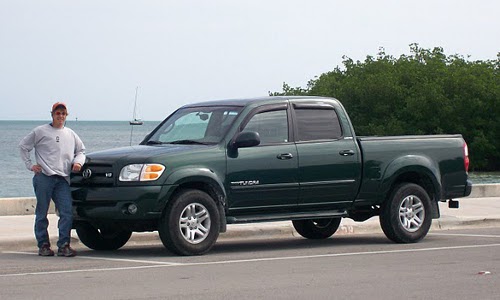
 Author Archive for Jason Lancaster
Author Archive for Jason Lancaster
Jason Lancaster is the editor and founder of TundraHeadquarters.com. He has nearly a decade of experience on the retail side of the auto industry, and another decade of experience of the part and accessory side of the industry.
Fuel Doctor Review – Introduction and Test Procedure
>> Be sure to check our official Fuel Doctor review post to see if it really works!
Guest Post By Toby of Tundra Fuel Economy blog.
February 1, 2011 – From a very early age I can remember thinking and wondering about fuel economy. While yet still quite young I came to the conclusion that absent drastic change in fuel economy it would be rather likely that we would run out of petroleum in our lifetime. I spend a lot of time thinking about how to improve fuel economy and have tested many of my personal theories and inventions. I have also tested devices or products available for sale to the general public. Some of these devices have worked while others have only served to lighten my wallet. I take nothing for granted and have found in a few instances that the general consensus is off base or completely wrong. I am a hands-on kind of guy and most of what I write about is based on my personal observations and testing.

Toby the Fuel Doctor tester next to his 2004 Tundra
When Jason contacted me asking if I would be interested in testing the Fuel Doctor for TundraHeadquarters.com and writing a review of the device, I was eager to get started. I must admit to a fair degree of skepticism after reading both how this device is purported operate and in the gains claimed. I know from personal experience that a 10% gain in fuel economy is an impressive improvement. Even so, I will test the Fuel Doctor in as scientific a manner as possible using a Scanguage II and the old reliable pen, paper, and calculator.
F-150 Reputation Resistant to Rust, Fire, and More. Why?
In the last 5 years, the Toyota Tundra has had some serious quality issues:
- Frame rust problems
- Weak tailgates
- Unintended acceleration recalls
While this list is definitely bad, can anyone honestly argue that it’s worse than the F150’s list of problems?
- 1.5 million trucks recalled for spontaneously exploding airbags
- Faulty cruise control modules that have been linked to dozens of vehicle fires
- 2+ million trucks likely to be recalled for rusting fuel tank straps
Granted, Ford has yet to recall the F-150 for rusting fuel tank straps, but all signs point to an imminent recall.
The question is: In light of all of this info, how can anyone honestly argue that Tundra’s reputation for quality or safety is any worse than the best-selling truck in the industry, the Ford F-150?
Safety and Fuel Economy Regulations Conspire To Reduce Truck Weight
One of the easiest ways to improve fuel economy is to reduce vehicle weight. Estimates range, but it’s safe to say that a 10% reduction in vehicle weight can boost fuel economy at least 5%, and perhaps as much as 10%. Weight reduction is also desirable because, unlike other fancier technologies (i.e. direct injection, variable valve lift, hybrid-electric, etc.) it’s a relatively simple and inexpensive process. If you want to cut vehicle weight, you:
- Find plastic you can replace with thinner plastic
- Find lightweight metal you can replace with heavy duty plastic
- Find steel you can replace with lighter metals
Simple, right?
OK – maybe not simple. Replacing a steel frame with a magnesium alloy (the most likely replacement material) means re-designing the entire vehicle…magnesium alloy is a different material with different assembly methods, so it’s not a matter of just swapping parts. Still, it’s less complicated to use alloys than it is to design fancy new engines, etc., which means that weight loss is a desirable method of fuel economy improvement.

Reducing the weight of the average pickup truck will improve fuel economy, but will consumers like the side effects?
Because pickup trucks are heavier than the average vehicle, and because a 10% improvement in truck fuel economy represents a greater fuel savings than a 10% improvement in car fuel economy, it’s logical to conclude that trucks must lose weight. The trouble is, consumers don’t necessarily want lighter vehicles (truck owners especially).
Thanks To An Earthquake, a Tsunami, and a Bail-out, GM Will Be World’s Largest Automaker Once Again
Thanks to $60 billion+ in U.S. and Canadian funds that saved the company and a tremendous, once in a thousand years natural disaster that’s crippled Toyota production, General Motors will likely be the world’s largest automaker for 2011. GM was the world’s largest automaker between 1932 and 2008, before losing the title to Toyota in 2009. While the value of being the “world’s largest” anything is dubious, there’s no denying that some people think being the world’s largest is an accomplishment.
If you find yourself talking to a person who thinks GM’s sales title is some sort of accomplishment, I’ve got some talking points for you.
1. Who cares? Does being the world’s largest automaker come with some sort of technological or economic advantage? Does every GM vehicle owner get a $100 rebate check as soon as GM becomes the world’s largest automaker, or does their GM product get an extra mpg after the award is announced? There’s nothing noteworthy about this statistic other than the statistic itself.
Excuses For Why The US Auto Industry Failed, And Then The REAL Reasons
GM icon Bob Lutz has a deserved reputation in the auto industry for being a visionary and an innovator. Lutz is a former Marine Corp aviator, a successful businessman, and he’s had a hand in developing a long and distinguished list of vehicles including the Dodge Viper, Ford Explorer, BMW 3-series, Cadillac CTS, the new Camaro…the list goes on.
In an interview at last week’s New York Auto Show, Lutz listed off five reasons for the failure of the US auto industry between the late 60’s and the last couple of years. These reasons are:
- Government fuel economy regulations
- Unfair Japanese exchange rates propped up by government subsidies
- Auto execs who were too focused on the bottom line
- The UAW (with the caveat that this was also partially a management failure)
- The media
You can read all of Lutz’s interview comments here (subscription req’d), but let me save you the trouble. Lutz just repeated the tired old excuses US car companies have used for decades. Here’s a break down:

